The Hermes 2012 Summer School on Materials Modelling and Science Communication
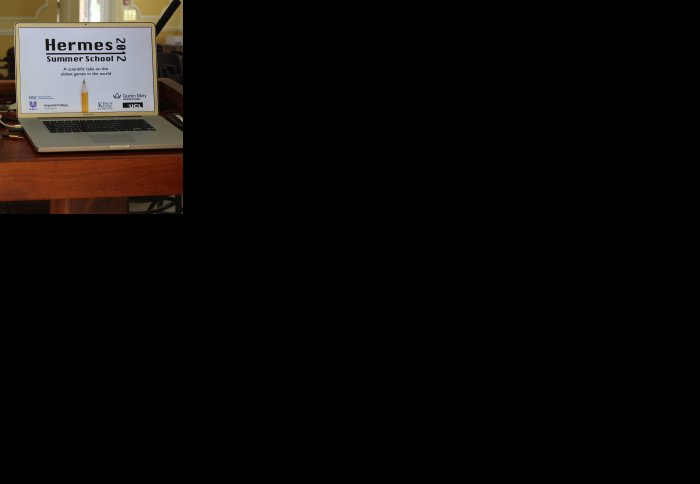
Twenty graduate students teamed up for London's first summer school on Materials Modelling and Science Communication
by Jassel Majevadia (PhD Student, Theory and Simulation of Materials)
Twenty graduate students from across the London universities teamed up during the opening weekend of the Olympics to orchestrate Hermes 2012, London's first summer school on Materials Modelling and Science Communication.
The tag-line of Hermes is to marry good science, and good science communication, and bring it to students from around the world, including to those from developing nations.
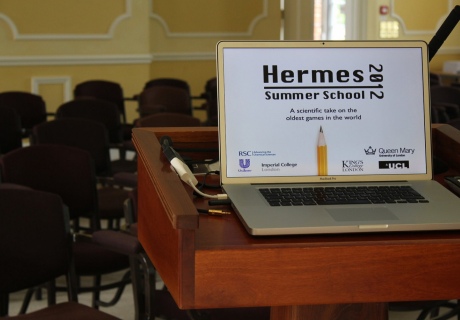
Preparations for Hermes 2012, a scientific take on the oldest games in the world.
The event was primarily aimed at addressing the dearth of cross-disciplinary thinking within materials science. This is particularly significant in the current climate of more and more of the world's technological challenges being highly multi-disciplinary. In addition, the team's ambition was to build up a global network of students who will continue to collaborate in the future on these pressing challenges. Finally, as impact and applicability of research is becoming paramount, Hermes 2012 aims to enable these excellent researchers to also communicate their research to the wider world, using a variety of media.
Hermes is a student-led initiative, developed and co-chaired by Jassel Majevadia and Aeneas Wiener. The other members of the highly motivated organising team stem from Imperial College London's Centre for Doctoral Training in the Theory and Simulation of Materials, who have joined forces with postgraduates from Queen Mary University, Kings College London, University College London, Imperial College's Science Communication department, and a team from the BBC, to develop this series of master-classes in modelling methods and a workshop on communicating science via video media.
Based at Cumberland Lodge in Windsor Great Park, the global network of participants experienced a sunny weekend in the company of four of the world's finest materials scientists.
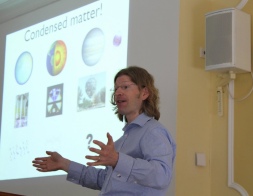
Professor Chris Pickard of UCL delivering his talk on Condensed Matter(!)
Professor Vaclav Vitek of the University of Pennsylvania is one of the world's authorities on fracture mechanics, and delivered a talk on understanding such a macroscopic phenomenon at the atomic level. Developer of the commercial ab initio modelling package CASTEP, Professor Chris Pickard of UCL, gave a gripping talk on the nature of truly condensed matter, describing the pressures experienced at the centre of Jupiter and the ability of simulation techniques to predict structures in these high pressure environments. The subtle distinction between strength and toughness in a material were conveyed by Professor Helena van Swygenhoven of the Paul Scherrer Institute, who emphasized the need to combine good theory and good experimental techniques to continue pushing the frontiers of materials science, enabling us to further develop materials for extreme conditions. And finally there was Professor Craig Carter from MIT, who debuted his talk on the beauty of calculus within the science of phase transformations, and within art. Using phase field and finite element simulations which he performed during his talk in real time, Professor Carter concluded his master class by introducing some of his most recent scientific works of art which are currently on display at the Smithsonian, New York's Museum of Modern Art and at Paris' Pompidou Centre.
This global network of materials scientists, from a variety of disciplines, has been assembled to inspire excellence in science and beyond. In addition to the four invited speakers, the 51 participants originate from 5 continents, and countries including Argentina, Brazil, Singapore, South Africa, Nigeria, Kenya, India and all across Europe.
The global nature of the event was demanded by the organising team, who have worked hard to obtain sponsorship in the region of £10,000 from the Royal Society of Chemistry and also from Unilever, which has helped fund the registration and travel of 6 scholarship winners from developing nations.
True to the spirit of the Olympics and friendly competition, the cohort of participants were split into 8 teams who were given a mere 24 hours to storyboard, film and edit a short film explaining a materials science concept from the master class lectures to a general audience. A media team from within the BBC and the science communication department at Imperial College facilitated these 8 videos with minimal equipment, employing a range of techniques including stop motion and animation to deliver their scientific message. The videos can be found on the Hermes Academy Youtube page. The winning team of the competition received iPod Touch's as their reward, to enable them to continue to create good scientific media in their own home institutions. The iPods and the Olympic style medals given to the runners up were provided by the London Centre for Nanotechnology.
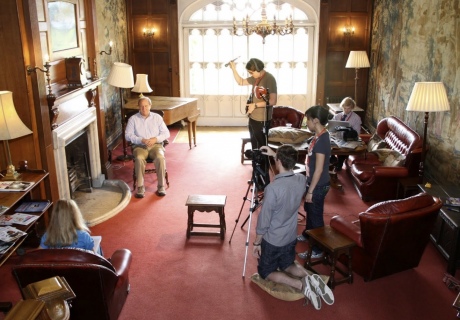
Professor Craig Carter is being interviewed by participants during the video making exercise at Hermes 2012
Â
In the running up to the Hermes 2012 weekend, the organising team has also developed the RSC-Hermes Challenge: "Why does hot water freeze faster than cold water?". The aim of the challenge was to obtain media exposure for the event, as well as to explore new ways for scientists to interact with the general public in a mutually beneficial and respectful way.
The competition was the brainchild of the Hermes organising team, who launched this campaign in collaboration with the RSC to inspire scientific and creative thinking amongst the general public. Following the competitionâs launch on 26 June 2012, the RSC-Hermes Challenge has resulted in over 20,000 submissions from amateur scientists from around the world. The Hermes server, in charge of collecting the submissions, very nearly crashed when the thousands of participants wrote in with their attempts to answer this seemingly simple question, which has continued to baffle scientists since even the days of Aristotle. The prize for the best effort was set at £1000, donated by the RSC.
In the wake of the RSC-Hermes challenge, the Hermes 2012 team has received a great deal of interest from the press, including BBC Radio 4's World at One show and Channel 4 News, where the co-chairs of the competition were both interviewed. In addition, the story has been covered by the online and print editions of the Guardian, the Daily Mail, and the Telegraph.
Following the Hermes 2012 conference, feedback has been overwhelming from both the participating students, the guest speakers and also from observers within the college:
âI am deeply impressed with what you have accomplished... With profound admiration for what you have given the communityâ - Professor Craig Carter (MIT)
â[Hermes 2012] embodied all the things that "transferable skills" are meant to be about and in particular showed the power of an emphasis on attitudes and behaviour... teamwork, sensitivity, empowerment, taking on responsibility in addition to the creativity [were] shown throughout.â - Julian Walsh (TSM CDT External Relations Director)
âI can't find the words to say how much I loved this workshop, I learned so much, and had so much fun.â - Lucile Dézerald (CEA Saclay)
âCheers to the organizing team. It was a nice work and you have inspired me a lot. Still can't imagine how students could arrange such a big event.â Â - Swastibrata Bhattacharyya (Indian Institute of Science, Bangalore)
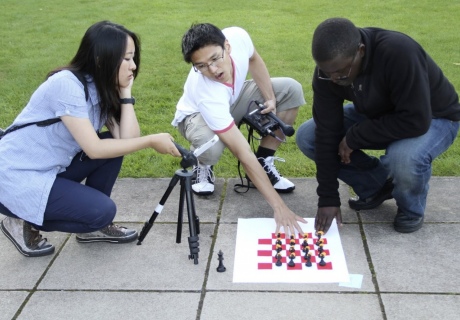
Hermes 2012 participants are using custom built chess pieces to explain the science underpinning the material properties of japanese samurai swords.
Article text (excluding photos or graphics) © Imperial College London.
Photos and graphics subject to third party copyright used with permission or © Imperial College London.
Reporter
Press Office
Communications and Public Affairs
- Email: press.office@imperial.ac.uk
